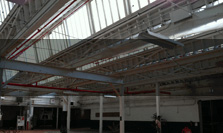Mill Record Newington
RETURN TO ‘FIND MILLS’Disclaimer: Content for these properties was compiled in 2014-2017 from a variety of sources and is subject to change. Updates are occasionally made under Property Information, however the Connecticut Trust for Historic Preservation (dba Preservation Connecticut) makes no representation or warranty that the information is complete or up-to-date.
- Complex Name (Common)
- Atrax Co.
- Complex Name (Historic)
-
- Atrax Co.
- Address or Location
- 240 Day Street, Newington
- County
- Hartford
- Historic Designation
- Associated Mill Community
- n/a

- Historic Information
Companies Associated w/Complex
- Atrax Co. 1946-1962
- Atrax Co., Div. of Simmonds International 1962-1981
- Merrow Machine Co. 1982-2004
Use (Historic)
Largest Documented Workforce
135 (ca. 1960).
Historic Narrative
The Atrax Company was organized in Newington by Carl Niederfringer and H. Paul Loewenberg in 1947. Both men previously worked for the Pratt and Whitney Company, Niederfringer as a supervisor, and Loewenberg as a sales manager. The firm established by the pair manufactured carbide rotary files, drills, and burrs, and occupied a shop erected for the company on Day Street in Newington, Connecticut. By the early-1960s, the Atrax Company had grown into the largest manufacturer of carbide drills and burrs in the country and its Newington plant employed 135 hands. This drew the attention of the tool conglomerate, Simonds International, of Fitchburg, Massachusetts, which acquired the Atrax Company and its plant in 1962. Simonds International preserved the Atrax Company and brand and a significant addition to the Newington plant was completed in 1963. This allowed the firm to expand its product lines, which by that point included a diverse array of burrs, drills, end mills, routers, keyseat cutters, and other tools. Simonds International continued to increase the business of the Atrax Company through the late-1960s and even built another plant in Claremont, New Hampshire in 1967. Various acquisitions and mergers impacted Simonds during the 1970s, and by 1979 the then-parent company, the Wallace-Murray Corporation, made the decision to move Atrax’s Newington operations to a new plant in Tuscaloosa, Alabama. The Day Street factory was acquired and expanded by the renowned Merrow Machine Company in 1982. Merrow Machine manufactured industrial sewing and crochet machines and was originally organized as a knitting mill in Mansfield, Connecticut, in 1838. The firm began producing its own machinery in 1840, and in 1877 developed the first viable crochet machine. The company moved its machine works and manufacturing plant to Hartford, Connecticut, in 1892, and continued to expand through a series of mergers during the mid-20th century. Merrow Machine occupied the Day Street plant from 1982 until 2004, whereupon operations were moved to Wareham, Massachusetts.
- Architectural Information
Number of Existing Buildings
Roughly five (5) adjoining primary blocks.
Dates of Construction
1947, 1963, 1982.
Architect
n/a
Builder
n/a
Building Type
Architectural Description
The former Atrax Company plant is comprised of five adjoining blocks located on the west side of Day Street, at the northwest corner of Day Street’s intersection with Francis Avenue. The oldest portion of the complex includes a pair of adjoining blocks erected in 1947. These consist of a one- and two-story, 52’ x 84’ concrete block office building; and a 184’ x 84’ concrete block manufacturing building. The office has buff brick apron walls on its primary (east and south) elevations, paired windows with concrete stills and hopper-style metal sash, concrete coping, and a flat roof. A cantilevered pent roof extends the full width of the block’s façade (east elevation) and shelters the primary entrance. The manufacturing building has large multi-pane metal sash with hopper-style openings, concrete coping, and a flat roof. The block was expanded 48’ to the north and 44’ to the west in 1963. The details of the addition mimic those of the original manufacturing block and their juncture is barely noticeable. A further addition to the plant was completed in 1982. This consisted of the construction of two one-story blocks adjoining the north end of the 1962 addition. The blocks measure 36’ x 62’ and 140’ x 152’ and they have concrete block walls, large window bays with brick spandrels and metal sliding windows, tall sheet metal cornices, and flat roofs. The smaller of the two blocks links the two phases of construction and serves as a loading area. A roll-up style metal door and steel hoist beams allowed product to be moved from the plant to waiting vehicles.
Exterior Material(s)
Structural System(s)
Roof Form
Roof Material
Power Source
Condition
Fair
Condition Notes
The complex is in fair condition. Overall the plant appears structurally sound and it retains the majority of its original fenestration.
- Property Information
-
Specific Location
One legal parcel (240 Day Street) totaling 3.18 acres located on the west side of Day Street, at the northwest corner of Day Street’s intersection with Francis Avenue.
Adjacent To
Exterior Visible from Public Road?
Yes
Parcel ID / Assessor Record Link
- 04/003/000. / Link →
Acreage
3.18
Use (Present)
- Sources
-
Form Completed By
Lucas A. Karmazinas
Date
08/17/2015
Bibliography
- List of Connecticut Manufacturers, 1922, 1924, 1930, 1932.
- Directory of Connecticut State Manufacturers, 1936, 1939.
- Industrial Directory of Connecticut, 1947.
- Register of War Production Facilities in Connecticut, 1951.
- Map of Hartford County, H & C.T. Smith, 1855.
- Atlas of Hartford County, Beers, Baker & Tilden, 1869.
- Aerial Survey of Connecticut, 1934, 1965.
- Hartford City Directories, Various editions.
- Simonds International, Facebook page.
- The Hartford Courant, 1999.
- Windham Textile & History Museum website.
- Representative View(s)Click on image to view full file






